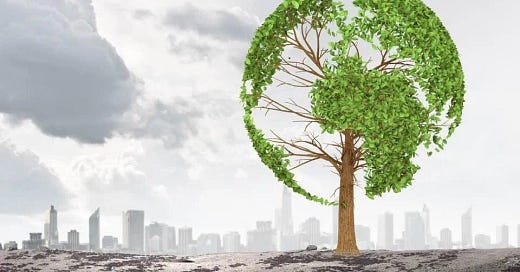I posted on Facebook one simple question: What shall we do about the capitalists? The resulting thread, with dozens of comments, led me here.
The answer is complex, but but in the end, the 8 billion of us will have to turn away from the ruling class oligarchs en masse. We must stop enabling them by buying what they are selling, product-wise and ideologically. We must stop making them bigger than life and ourselves small.
What they have is more ones and zeroes stored in the various counting programs. These are small electronic signifiers. They are only real because the vast majority of us believe they are real.
What if we withdrew our collective consent?
The problem is with the requirement that it be done collectively when the collective is made up of billions of individuals. And just enough of the individuals get just enough out of the status quo to dull the pain to a manageable level.
The boot on those necks is less of a problem for them than doing something. Something with no guarantee of success. The devil they know.
But imagine if we stopped giving credence to the currency that gives them their power and created a different system right beneath the one in place now.
What if we stopped buying it?
One woman, a friend who thinks about these things, commented that this would mean not buying anything. She went on to discuss the idea, common in American thought, that anyone in any business of any size is a capitalist. So I felt I should clarify my meaning in this context.
By “capitalist” I mean it in the old-fashioned sense: Owner of the means of production. We are small business owners, entrepreneurs, but not capitalists in that sense.
The word "capital" can mean any assets one might have. But in terms of the capitalist system, it means the captains of industry, and, these days, with money divorced from value, and financial capital divorced from production, it also refers to the self-appointed "Masters of the Universe".
There are some good things in small "c" capitalism, just as there are in small "c" communism. Both have outlived there use in a world on the brink of ecological collapse. The 6th mass extinction is fueled by unrestrained capitalism. The climate collapse, likewise. So, in the end, we will have to stop buying most things.
There are scientists and experts who give our species an even chance of making it to the 22nd century. When I post about that, there is always a chorus of people, bright, decent people, who say we deserve extinction for our sins.
I think that is defeatist at best and profoundly cynical at worst. The great mass of humans are not driving or benefiting from the capitalist ecocide. We are hostages. And humans, whatever our flaws, are a miracle. We grieve the extinct dodo bird and the white rhino. Who then will grieve us?
No, I am a humanist. I want 1000 more generations after me. But the center is not holding.
Right now, TWELVE FAMILIES AND INDIVIDUALS own 2 trillion in wealth. The bottom HALF own 3.5 trillion. The center cannot hold. The killing of the United Health Care CEO yesterday, though sad, is a symptom of a broad disease.
Murder is wrong, but the real tragedy is the hundreds of thousands in the last couple of years who died by denial of care. The major shareholders of United Healthcare are capitalists in the sense I mean. The small store owners that use them as a carrier are not.





As an old Berkeley radical who grew up in the 60's, I think still we had the right ideas. We talked about "going back to the land", we aspired to "live in communes", we had "free boxes", we tried to live simply and with less, we talked (and I think this is especially important now) about buying local and small businesses, we wanted hand crafts, we were recycling our bags at the Food Co-op in 1970, we bought food in bulk, the "Diggers" (and later Food Not Bombs) picked up unwanted food from stores to distribute, we talked about 'zero population growth" and some of us got tubal ligations............ and so on. Some of those ideas or groups still last, but a lot of it has been dismissed, forgotten, or trivialized. But really, in retrospect, they are still the ideas that we need urgently now. Use less, share more.